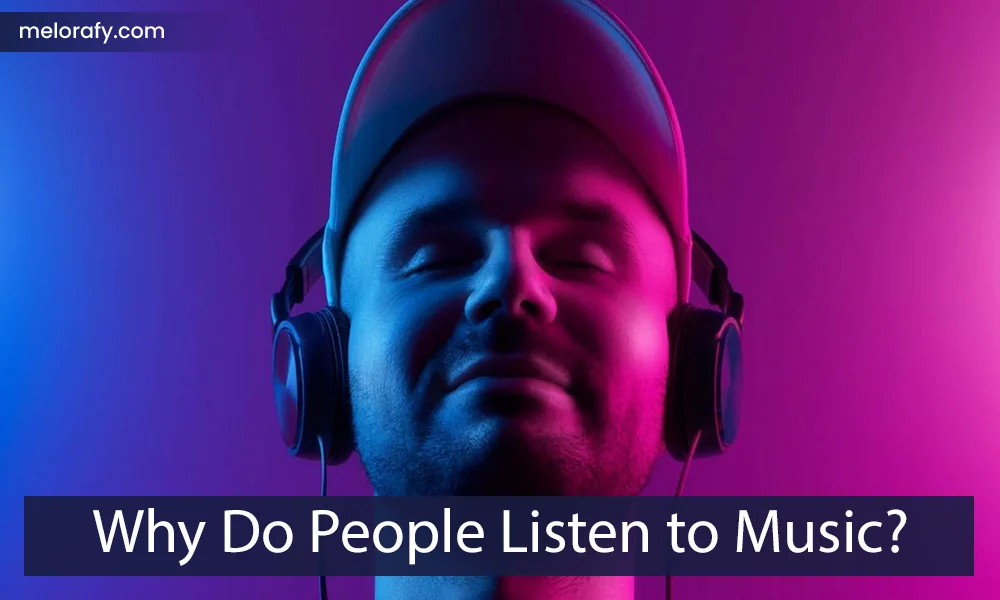
Why Do People Listen to Music?
Music, beyond language, culture and time, has a unique place in human experience. From the rhythms of ancient drums to Beethoven’s symphonies, from the heartache of the blues to the joy of pop, music is a universal language that speaks directly to the soul. But what causes this timeless appeal? In this article, together with Melorafy, we are examining the multifaceted nature of listening to music and clarifying its emotional, psychological and social effects.
Emotional Resonance
One of the most profound reasons people listen to music is for its emotional impact. Music has the power to evoke a wide range of emotions, from joy to sadness, anger to love. It can uplift spirits, provide solace in moments of distress, and enhance moments of happiness. This emotional connection is deeply rooted in the brain’s limbic system, which processes emotions and memories. Listening to music can release various neurotransmitters like dopamine, which is associated with pleasure and reward.
Stress Relief and Relaxation
In today’s fast-paced world, music serves as a sanctuary for relaxation and stress relief. The soothing sounds of a melody or the gentle rhythms of a song can calm the mind, reduce anxiety, and help in managing stress. Studies have shown that music with a slow tempo can lower the heart rate and decrease levels of cortisol, a hormone associated with stress.
Cognitive Benefits
![]()
Listening to music is not just a passive activity; it actively engages the brain, offering various cognitive benefits. It can improve focus, enhance memory, and stimulate creativity. Music education, in particular, has been shown to boost cognitive development in children, enhancing skills like problem-solving and critical thinking.
Soundtrack to Our Lives
Music marks the milestones of our lives. From birthdays to weddings, graduations to funerals, music is a constant companion that enhances the significance of life’s moments. It has the unique ability to anchor us to specific memories, allowing us to revisit the past and re-experience emotions and moments tied to those tunes.
Social Connection
Music is a powerful social glue that brings people together. It fosters a sense of community and belonging, whether it’s through shared tastes, concert gatherings, or communal singing. Music transcends cultural and linguistic barriers, allowing people from different backgrounds to connect on an emotional level.
Identity and Self-Expression
For many, music is a form of self-expression and identity. The music one listens to can reflect personal values, struggles, and aspirations. It’s a medium through which individuals can express their unique personality and find solidarity with others who share similar tastes or experiences.
The Universal Language
Perhaps the most enchanting aspect of music is its status as a universal language. Without a single spoken word, music can convey messages and emotions that resonate with people worldwide. This universality makes music a powerful tool for cultural exchange and understanding.
Therapeutic Uses
![]()
Music’s impact goes beyond entertainment; it has therapeutic uses that can aid in physical and mental health. Music therapy is an established field that utilizes music to address emotional, cognitive, and social needs of individuals. It has been effectively used in various settings, including hospitals, schools, and elder care facilities, to promote healing and enhance quality of life.
The reasons people listen to music are as diverse and complex as humanity itself. From its emotional resonance to cognitive benefits, from its role in social bonding to its therapeutic uses, music touches every aspect of our lives. It is a reflection of our collective joys, sorrows, and hopes. In essence, music is not just something we listen to; it’s a profound part of what makes us human.
As we continue to explore and understand the depths of music’s impact, one thing remains clear: music is an indispensable part of the human experience, offering solace, joy, and connection in an often chaotic world. So the next time you press play on your favorite song, remember, you’re tapping into one of the most profound expressions of human culture and emotion.
Changing your heart rate
Music can regulate your heart rate, blood pressure and even your breathing. People who have been playing an instrument for some time or even listen to music continuously have more ability to distinguish different sounds compared to normal people. Different sounds cause changes in the cardiovascular system and brain of these people and also control some involuntary behavior such as breathing and heart rate.
Reduce stress by listening to music
Listening to a song you enjoy will greatly reduce the stress level in your body. It is very important that stress is the cause of 60% of all known illnesses and diseases. So, we recommend you to turn on the radio, sing along with it, or even tap your foot to the beat of it to keep your health and peace during the day.
A happy or sad piece of music can make us feel special. Our brain reacts differently to happy and sad music. Therefore, happy songs that make you feel happy and uplifted will clearly have a direct impact on your perception of the world around you.
In a study conducted, researchers observed that people who listened to relaxing music for 45 minutes before going to sleep slept significantly better than normal people. So if you have trouble sleeping, we recommend you to include listening to soft and relaxing pieces in your schedule before going to bed.